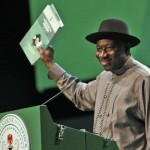Buhari who has just been announced as the next Nigeria’s president. Step-by-step, Omojuwa explains how the outgoing President Goodluck Jonathan lost the trust and good graces of Nigerians. PDP’s President Jonathan called General Muhammadu Buhari of the APC to congratulate him. The 2015 president election has been won and lost. We are waiting for the INEC to deliver the official numbers.
Nigeria’s President Jonathan was almost a great president — for about five weeks — if you somehow forget he was a dormant, incompetent, careless and an insensitive one for almost five years.
We will come back to that.
This is the greatest news out of Africa for a long time. For the first time ever, the president of Africa’s biggest democracy has been voted out of power. The continent has Nigeria’s President Goodluck Jonathan to thank for that. President Jonathan lost the 2015 presidential election because of many reasons, but none more telling than this one reason: Goodluck Jonathan himself.
A few hours from now, the INEC is expected to declare General Buhari president-elect. According to the expected result, General Muhammadu Buhari won 21 states to Jonathan’s 15 and the Federal Capital Territory, Abuja.
This is a case when of the incumbent president almost singlehandedly defeating himself. He “helped” himself lose the election and by so doing, became the first-ever incumbent president of a major African democracy to be voted out of power.
It all started from the very beginning, when president Jonathan got voted in as Nigeria’s fourth democratic president. His first major pursuit was a bill seeking to extend the tenure of office of the president from four (4) years to six (6) years. This move failed as Jonathan was to set himself up on a series of lost battles, not just with the people, but even the-then not so strong opposition.
Then came January 1, 2012. This was the day the Jonathan government started its journey to a historic exit, an exit constitutionally scheduled for May 29, 2015. Ask an average voter who voted for president Jonathan in 2011, they’d tell you this was the day Jonathan missed it with them. No one could understand why the president would increase fuel prices drastically on the very first day of the year. The public anger and protests that came after cost the nation several days of business losses, and it ultimately cost the Jonathan government the people’s trust.
It went downhill from there.
If losing people’s support started with #OccupyNigeria and the fuel subsidy crisis, Jonathan’s biggest political loss has to be the defection of former PDP heavyweights, like Senator Bukola Saraki who left with ten other serving senators, former vice president Atiku Abubakar, Sen Mohammed Danjuma Goje, then-serving governors Abubakar Kawu Baraje, Rotimi Amaechi, Rabiu Kwankwaso – whose Kano votes were more than crucial,– Murtala Nyako (Adamawa), Abdulfatah Ahmed (Kwara) and Magatakarda Wamakko (Sokoto).
All of these power blocs moved with an innumerable number of House of Representatives members, State Houses of Assembly members, and other supporters across the country. The PDP had already suffered a blow it was never to recover from, but the defection of the speaker, House of Representatives, Aminu Tambuwal further dented president Jonathan’s hopes of a return. After the defections, the PDP was already playing catch up to the APC in terms of political arsenal for the 2015 elections.
But that was not all. A lot has been said about President Jonathan’s inability to handle the insurgency in the northeast. Nigeria has almost become synonymous with Boko Haram abroad, as tens of thousands of lives have been lost over the last five years. The only thing worse than the government’s tepid response to Boko Haram is the president’s almost nonchalant response to some major bombings and abduction incidents. The abduction of the Chibok girls, the 18 days it took the Jonathan administration to agree it did indeed happen, the refusal to receive help from the international community, the refusal to commit to a proactive rescue effort, virtually everything around the Chibok abduction, eventually and deservingly came to haunt Goodluck Jonathan at the polls.
On the 14th of April, 2014, about 200 people were killed by terrorists as Nyanya, an inner-city town in Nigeria’s Abuja FCT, got bombed. Less than 24 hours after that tragic incident, president Jonathan was swiftly in Kano, to welcome a defecting Ibrahim Shekarau who was leaving the APC for the PDP. Not only was the president at this political rally at a time his citizens were mourning, the president was caught by cameras dancing the day away. It turned out to be one of the most popular pictures illustrating of his government.
There are countless other tragic incidents that had Goodluck Jonathan acting like he was just president for cosmetic reasons. Response to the death of some 19 citizens who had gone to write the Nigerian Immigration exams nationwide, grief expressed one year late after 59 boys were butchered in March of 2014 at Buni Yadi, the Baga massacre that had the president reacting to the death of 12 people killed in France while maintaining a loud silence as about 2000 of his own citizens got wasted by Boko Haram and a whole town razed down… Examples are endless.
All of these would still have had president Jonathan returned as president. Would have, had the opposition remained what it was until 2013: a cluster of Lilliputian parties, at best pulling their weight regionally. The birth of the All Progressives Congress in February 2013 ended all that.
In its early days, the APC did indeed look like they were all coming together to rescue Nigeria from Goodluck Jonathan. The government underrated the new party as they banked on the aligning political parties and power blocs to eventually break up over power sharing issues, a reality they expected to come to a boil in December of 2014 when the party had its presidential primaries. To the shock of many, the APC came out of that better and stronger. It was only then that president Jonathan and his handlers realized they had a game on their hands. This, though, is a game they lost before they even realized it had started.
This election will be incomplete without the army of young Nigerian citizens who are active on social media. The core of this group were the same young Nigerians who had organized and executed the Occupy Nigeria protests. We certainly played our role in this defeat of unarguably Nigeria’s most ineffective government. Someone else, not this author, would better write that part of the story.
It’d be hard to completely capture all the reasons president Jonathan was deservingly beaten by the APC’s General Buhari at this historic presidential election, but the above certainly offer a snapshot look into why Nigeria will now get a new president on the 29th of May, 2015. Congratulations to General Muhammadu Buhari, but most especially, to Nigerians. They rewarded incompetence for once. Long may this trend continue.
By Japheth Omojuwa


A lot of what you assert is astonishingly precise and that makes me wonder the reason why I had not looked at this in this light previously. This particular piece truly did switch the light on for me personally as far as this specific topic goes. But at this time there is one particular position I am not really too comfy with and while I try to reconcile that with the actual central theme of your issue, permit me see what the rest of your readers have to say.Well done.